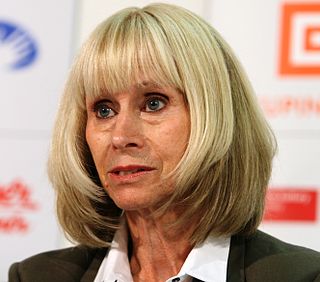A Quote by Keren Woodward
When we first were working, we had no money. We were all sharing this ghastly flat and we had nothing.
Related Quotes
The people that did it the way they were supposed to do it, the way they were taught in school: save your money, so that when you retire.They get nothing. They have nothing. They were going to live off the interest of the money. They don't have money. And then on top of it you had the problems of nine years ago [in 2005] with the mortgages so half of them their houses have been taken away.
I knew I had found my life's passion after writing my first column for The Washington Post. The response was like nothing we had seen in the business section. Everyday people were writing that finally someone was speaking to them in a way that was understandable. I think we were all shocked at how many readers wrote in to say that they too had a Big Mama who taught them about money.
It was 1999, and we were building a way for college kids to create online profiles for the purpose of sharing... with employers. Oops. I vividly remember the moment I realized my company was going to fail. My co-founder and I were at our wits' end. By 2001, the dot-com bubble had burst, and we had spent all our money.
The Andrians were the first of the islanders to refuse Themistocles' demand for money. He had put it to them that they would be unable to avoid paying, because the Athenians had the support of two powerful deities, one called Persuasion and the other Compulsion.The Andrians had replied that Athens was lucky to have two such useful gods, who were obviously responsible for her wealth and greatness; unfortunately, they themselves, in their small & inadequate land, had two utterly useless deities, who refused to leave the island and insisted on staying; and their names were Poverty and Inability.
The paintings that laughed at him merrily from the walls were like nothing he had ever seen or dreamed of. Gone were the flat, thin surfaces. Gone was the sentimental sobriety. Gone was the brown gravy in which Europe had been bathing its pictures for centuries. Here were pictures riotously mad with the sun. With light and air and throbbing vivacity. Paintings of ballet girls backstage, done in primitive reds, greens, and blues thrown next to each other irreverantly. He looked at the signature. Degas.
From the little reading I had done I had observed that the men who were most in life, who were molding life, who were life itself, ate little, slept little, owned little or nothing. They had no illusions about duty, or the perpetuation of their kith and kin, or the preservation of the State. They were interested in truth and in truth alone. They recognized only one kind of activity - creation.
Woodfall wasn't deliberately telling working-class stories, but John Osborne and other writers who were involved with them were writing those stories, which had never really been written before. The working-class person always had to have an accent before, was often a joker, and peripheral. At Woodfall, they were driving the film.
I'm a product of state schools. I had a working-class family. We had no books. I was the first to go to college. But I didn't really think about it, or about making money. I was just going to be an artist, and I've been fortunate. I've never had to work for anybody nor have I had to write for money. Maybe that's another reason that I've been able to be productive. I haven't had to use my writing to make a living.
I was always embarresed by the words 'sacred,' 'glorious,' and 'sacrifice' and the expression 'in vain.' We had heard them, sometimes standing in the rain almost out of earshot, so that only the shouted words came through, and had read them on proclamations that were slapped up by billposters over other proclamations, now for a long time, and I had seen nothing sacred, and the things that were glorious had no glory and the sacrifices were like the stock yards at Chicago if nothing was done with the meat except to bury it.



































